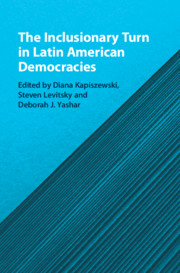Book contents
- The Inclusionary Turn in Latin American Democracies
- The Inclusionary Turn in Latin American Democracies
- Copyright page
- Contents
- Figures
- Tables
- Contributors
- Acknowledgments
- Prologue: Reflections on Two Episodes of Popular Inclusion
- 1 Inequality, Democracy, and the Inclusionary Turn in Latin America
- Part I Extending Social Policy and Participation
- Part II Inclusion and Partisan Representation
- Part III New Party–Society Linkages
- Part IV Inclusion, Populism, and Democracy
- 12 Pathways to Inclusion in Latin America
- 13 Inclusionary Turn, Rentier Populism, and Emerging Legacies
- 14 Strong Citizens, Strong Presidents
- 15 Shaping the People
- 16 The Inclusionary Turn and Its Political Limitations
- References
13 - Inclusionary Turn, Rentier Populism, and Emerging Legacies
The Political Effects of the Commodity Boom
from Part IV - Inclusion, Populism, and Democracy
Published online by Cambridge University Press: 12 January 2021
- The Inclusionary Turn in Latin American Democracies
- The Inclusionary Turn in Latin American Democracies
- Copyright page
- Contents
- Figures
- Tables
- Contributors
- Acknowledgments
- Prologue: Reflections on Two Episodes of Popular Inclusion
- 1 Inequality, Democracy, and the Inclusionary Turn in Latin America
- Part I Extending Social Policy and Participation
- Part II Inclusion and Partisan Representation
- Part III New Party–Society Linkages
- Part IV Inclusion, Populism, and Democracy
- 12 Pathways to Inclusion in Latin America
- 13 Inclusionary Turn, Rentier Populism, and Emerging Legacies
- 14 Strong Citizens, Strong Presidents
- 15 Shaping the People
- 16 The Inclusionary Turn and Its Political Limitations
- References
Summary
An international economic boom was the necessary condition for the sustainability of the inclusionary turn. The boom affected countries differently depending on domestic structures of power. If the economic boom coincided with the twin collapse of the party system and the capital markets, the inclusionary turn manifested itself as rentier populism, a coalition that dominated Argentina, Bolivia, Ecuador, and Venezuela. Rentier Populism is the social basis of super-presidentialism in good economic times. Yet, it becomes incompatible both with socioeconomic inclusion and liberal democracy in hard times.
- Type
- Chapter
- Information
- The Inclusionary Turn in Latin American Democracies , pp. 434 - 460Publisher: Cambridge University PressPrint publication year: 2021
References
- 1
- Cited by

